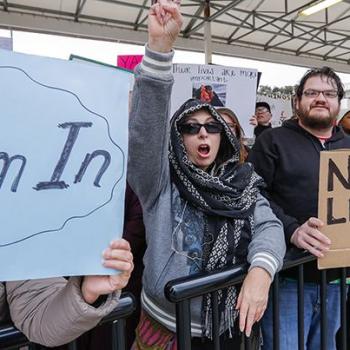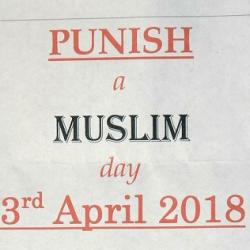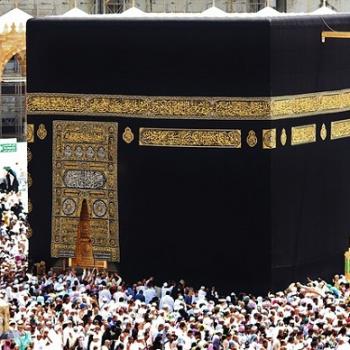It’s the Ashura today (or ninth of Muharram, depending on what version of the Islamic calendar you follow). By way of a quick history, Ashura, which falls on the 10th of Muharram (the first month in the Muslim lunar calendar), is a significant day for all Muslims, but is marked as a major religious occasion for Shi’a Muslims. It is the day (in 680 A.D.) when Imam Hussein, the grandson of the Prophet Muhammad (saw) was martyred in Karbala, which is located in modern-day Iraq.
All Muslims are encouraged (but not required) to fast on this day, as we are taught that fasting on the ninth and tenth of Muharram will bring us great rewards and is a very approrpiate way to mark this occasion. The Prophet Muhammad (saw) often fasted on this day, and this day is tied to several momentious religious moments: The Prophet Nuh (Noah) left the ark after the flood on this day, and the Prophet Musa (Moses) was saved from the Egyptians by God on this day.
In Bukhari and Muslim from Ibn Abbas (Allah be pleased with him) it is said that he was asked about fasting the Day of Ashura [10th of Muharram]. He said, “I did not see the Messenger of Allah (blessings and peace be upon him) fast a day while more avid to seek its virtue than this day [meaning the Day of Ashura]. [Bukhari (2006), and Muslim (1132)].”
For a Shi’a perspective, I found the words of Omid Safi, a professsor of Islamic Studies at the University of North Carolina and author of the new book Memories of Muhammad: Why the Prophet Matters, very interesting in his description of the Shi’a mourning ceremonies of Ashura, and the ways Shi’as should mark the day. He recently gave an interview for an Iranian news agency, where he said:
“The mourning ceremonies of Ashura are of course an important way in which we demonstrate our love affection for Imam Hossein, and through him, the Prophet. I am committed to the notion that identification with the redemptive suffering of the imam is a key aspect of Shi’I piety. And I would add two other elements: in the mourning, we have to be sure to continue to honor the sanctity of the human body, which is after all the creation of God. So in my own personal reckoning, I would prefer to see taking stories to heart, shedding of tears, and even the striking of one’s chest gently with one’s hand. I would suggest avoiding any action that would lead to shedding of blood (using knives, etc.) or leaving bruises (such as chains). Furthermore, I would add that the foremost way of honoring Imam Hossein is not by sinking into the abyss of melancholy, but rather “carving a tunnel of hope through the great mountain of despair.” What would best serve the cause of Imam Hossein and Islam is not to sit in mourning but rather to rise in protest, rise majestically like Imam Hossein against all the Yazids of the world today. The Yazids of the world are sometimes individuals every bit as devious as Shemr and Yazid of yesteryears, but more often entities and concepts like oppression, greed, occupation, militarism, brutality, violence, and every oppressive ideology that stands in the way of affirming the dignity and integrity of each and every member of humanity. May all these Yazids, literal and metaphorical, be upended on this and every Ashura, so that we can realize the daily relevance of the teachings of a beautiful and meaningful Islam .”
And in his Facebook status update over the weekend, Professor Safi wrote that beyond being something just for Shi’as to mark, Ashura has significance for all:
The martyrdom of Imam Hossein is indeed a cosmic event whose significance is far greater than merely a bloody battle or even a massacre in the remote plains of 7th century Iraq. It is a reminder that there is real injustice in this world, and one has the cosmic responsibility to rise up against it. What happened “there” and then is also projected against all time and space. The question is not what Imam Hossein did in the month of Muharram of the year 680 on the plains of Karbala in Iraq, but rather what are we doing today. Every day is Ashura, Every place is Karbala.
I find his observations very interesting and spiritual, in that he takes a significant moment in Islamic history, something that led to the split of Muslims into two main sects – Sunnis and Shi’as – and reminds all Muslims the martyrdom of Imam Hussein was a “cosmic” event, and that instead of spending our time in mourning, we should all rise in protest against the injustices that still plague this world.
Imam Zaid Shakir of the Zaytuna Institute in California also offers a very good video on the virtues and significance of Ashura. I advise you to check it out here. Though it is long, take some time and watch it.
http://www.youtube.com/watch?v=KYw3ptrMo9YIf you are fasting today, I pray that Allah (swt) accepts your fast. If you are unable to, I pray that any worship you do will be accepted and rewarded. As for us – my children, husband, and I will be Face-timing with my father tonight, who has prepared a special lesson/story on Ashura for the kids. It’s the next best thing to the nights we spent in front of our fireplace growing up in North Dakota, where we learned about Islam and all the significant days and practices at the knees of my father, before there was Sunday School, Islamic School, a plethora of readily-available Islamic books, or the Internet to supplant our knowledge.











